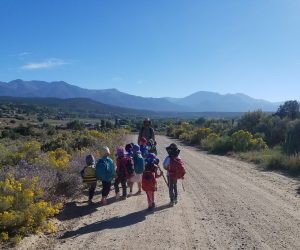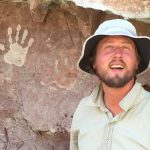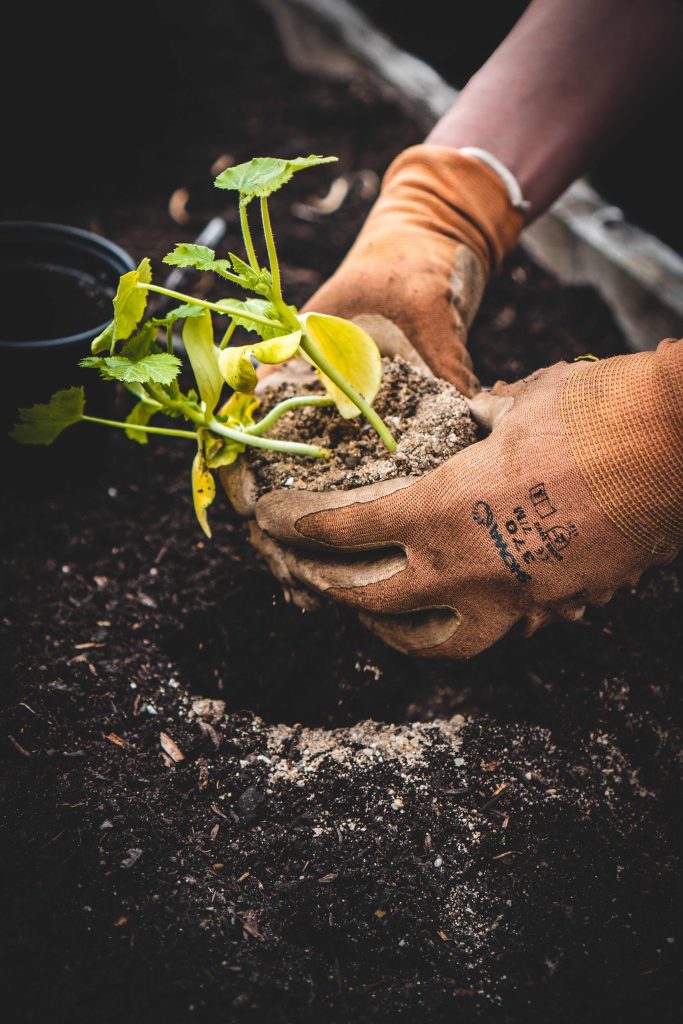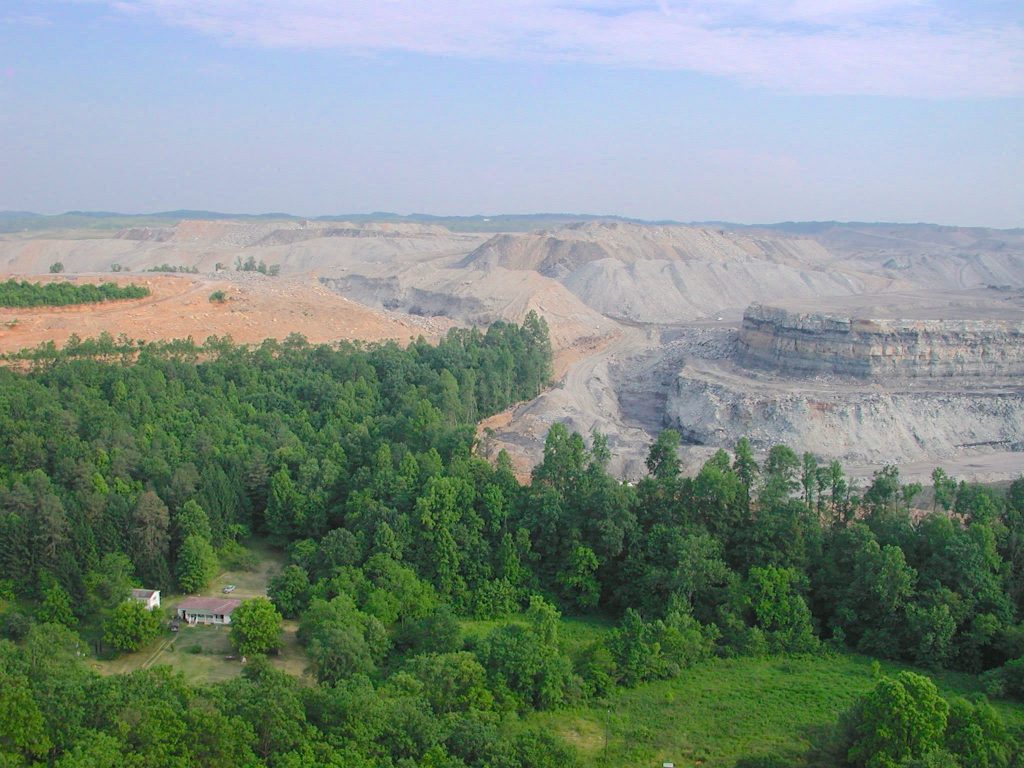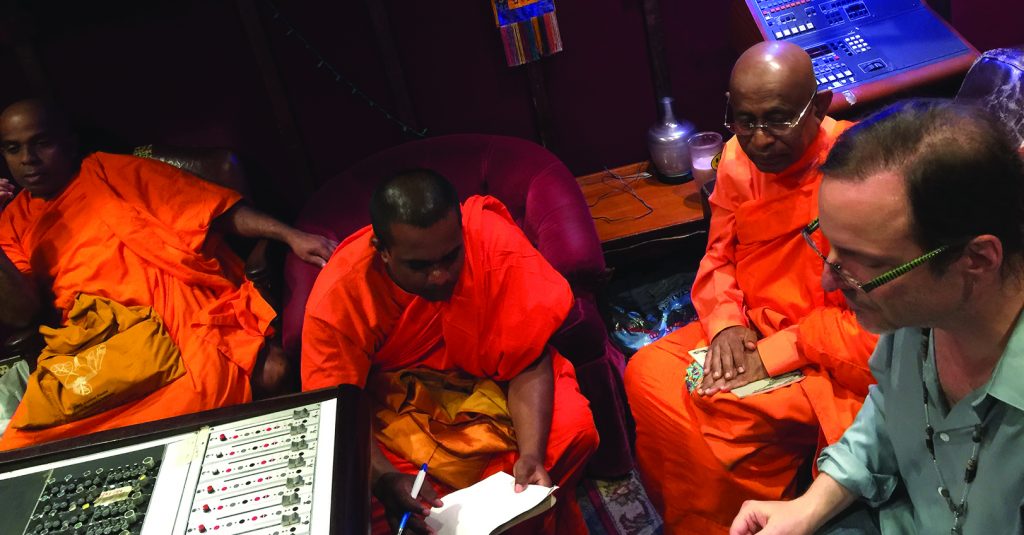An Uncommon Song
One week in early February, a local artist visited our class and led us in the painting of a mural. Using thick creamy paints, the kids took turns filling a piece of craft paper the size of a kitchen table with whimsical plants, sunbursts, and big, fat raindrops. There was a red heart in the center. It was winter, but we painted outside in shirtsleeves. It had been warm and dry for months, and we needed those raindrops desperately.
Throughout painting, we sang. The children followed along at first, then carried the melodies into their brushstrokes. Our visiting artist hummed. Birds whistled. Moving my hand back and forth in the water bucket, we soon had a sloshy rhythm section. I am not a musician, but I have come to love the sound of living things—tree branches that sound like marimbas, pinecones like tiny thumb pianos, the blip, bloop, blop of stones as they fall into the river.
The relationship between song and education is well-known. Many have written on the subject, perhaps most famously Plato in The Republic. In the story, Socrates warns about the dangers of teaching certain ungodly songs. If the gods are portrayed as vengeful and cruel, he says, what will prevent our children from emulating them?
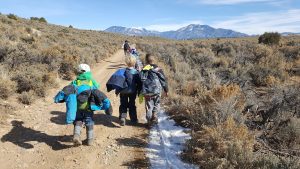
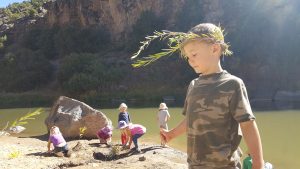
My daughter grew up in an intentional community. Song permeated our days. It filled our meetings, our meal blessings, and even our work parties. For most of my life, I recoiled at such sentiment. Too cheesy. Or worse, evidence of cultism. And that is precisely the message Plato intended—song invades the mind and heart, and whatever message rides that melody buries itself deep in a person’s bearing. So, do not think this an idle subject. It is one of the most potent forces known to humankind—song.
Song can hold us as individuals, but it can also carry a whole group, a movement, a nation. As the children dabbed bright colors in their little aprons, the mural slowly expanded above their heads. A massive blue sky—the real one—towered over us, and each brushstroke was lifted with song. The kids beamed with the task. The task of painting. The task of singing. The task of being alive. Birds flew by. Trees danced in the wind. There were only nine of us there, just a handful of humans on this planet, but we squeezed every last ounce out of that moment, achieving something all too rare and precious today—unadulterated life.
This was how we prepared for Valentine’s Day.
School for the Earth Children, our small outdoor kindergarten, usually begins with Silke leading the kids on a walk into the woods or a nearby canyon, me sweeping stragglers in the back. The mountains and canyons of New Mexico offer a rarefied classroom and we take every advantage. There is no school building. But on this particular day, we braved the morning traffic and met in the center of town. We put on heart bands and necklaces and began walking toward the bank. Along the way, we sang.
The first folks we met stood with hardened expressions outside the Presbyterian Church. It appeared to be an early AA meeting. Silke led us directly through them, singing The Heartbeat of the Universe. One of them, a young man smoking a cigarette, smiled uncomfortably. Another ducked inside. But several men and women caught our eyes and smiled back. The kids handed out felt hearts.
Then we hit the bank. The tellers, all women, nearly swooned. My old boss was inside. We hugged, then sang together, and shared valentines all around. Stepping outside, we crossed the street to the bakery. It was closed. But the owner was in the back and he came out with a tray of snacks for the kids. The children gave him a felt heart and a cookie, then drew chalk hearts all over the sidewalk.
We went to the copy store, the fiber arts store, and a construction site—all impromptu. Silke led our merry train. We waved at cars and attracted the eyes of pedestrians all over Taos. We had done much the same at Christmas, caroling the holiday hit list. This time, the children smiled and sang love songs. “Happy Valentine’s Day,” I said from the caboose with a smile.
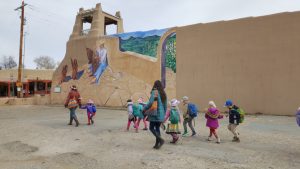
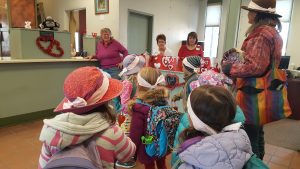
Just before noon, we arrived at World Cup, the coffee shop at the center of Taos. The kids got hot cocoa and sang with the patrons inside, then we scurried out the door and headed toward the plaza. We only had a moment to get there to meet the rest of our group, but along the way we ran into a young man, a street musician dressed all in black. He had downcast eyes and a severe expression. I assumed we’d smile politely and pass by—Taos is full of drifters like this—but Silke stopped us front and center and asked him for a song.
The young man looked up uncertainly. One of our kids complimented him on his guitar. Another asked if he was a real musician. We all laughed. One child noticed a pen near his foot, picked it up and placed it in his shirt pocket. Finally, the young man sang. He called it a lullaby, but I think it was a love song. Every young man yearns to be noticed. Every human being craves to be touched. When he finished, he looked up with a soft expression, then recalled himself. Silke placed a few dollars in his hat, and the kids waved goodbye.
We crossed the street to Taos plaza. Four other teachers met us there, along with their students and several other men and women. There were two-year-olds and kindergartners; first-, second-, third-, sixth-, and seventh-graders; mothers, fathers, babies, uncles, grandmas. All told, about 50 big-hearted folks.
We held hands and sang songs. We jumped rope and laughed. We smiled shyly, then brashly, at passersby. Silke wove us through the plaza, hand in hand, like a train. As we sang, I recalled the painting of the mural, the AA meeting, and the bankers; the coffee shop and the bakery; the street musician. A police truck rolled by. Life is imbalanced sometimes. Songs come and go. Sometimes we aren’t beautiful. Winters can be dry.
That evening, I learned that a young man in Florida had walked into school and opened fire on his classmates, robbing us of the lives of 17 young men and women who no longer have a voice to sing.
Valentine’s Day.
That night, it rained all over Taos.
